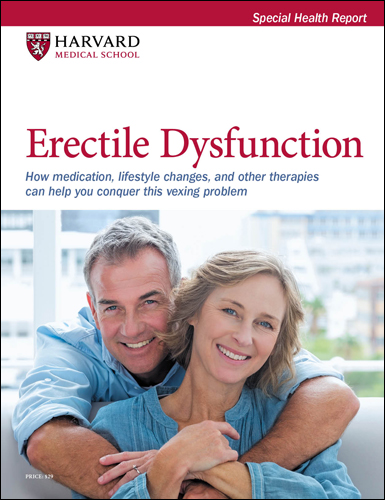Overcoming bedroom barriers
Here's how to manage common obstacles men and their partners may encounter in their sex life.
- Reviewed by Howard E. LeWine, MD, Chief Medical Editor, Harvard Health Publishing; Editorial Advisory Board Member, Harvard Health Publishing

Every aspect of your life changes over time, and your sexual life is no exception.
"Partners in relationships face many challenges that can affect intimacy, whether those are health issues, physical changes, or fluctuations in desire," says Dr. Sharon Bober, director of the Sexual Health Program at Harvard-affiliated Dana-Farber Cancer Institute. "Older couples often have core beliefs, including that their sex life is bound to diminish or that individuals need to conform to a certain ideal as they age, but with communication, planning, and creativity, both partners can continue to enjoy a satisfying sexual relationship over time."
Here's a look at three common issues older couples often face and how to successfully navigate them.
Stuck in a rut
Eventually, most longtime partners get stuck in romantic ruts. Here are some ways to get back on track.
Start dating again. A satisfying sex life begins outside of the bedroom. Schedule regular dates with your partner, and consider having experiences that are new for both of you, like participating in a local event, taking a class together, or going on a spontaneous overnight or weekend romantic getaway to a new place. "Doing something different and unexpected can offer a shared sense of excitement that increases desire and can bring you and your partner closer together, which also helps cultivate desire," says Dr. Bober.
Turn it around. Focus less on yourself and more on your partner's pleasure and satisfaction. "This can be a big turn-on for both people," says Dr. Bober.
Out of sync
Many couples go through phases where desire is not equally shared. "When one partner wants sex more often than the other, this can lead to frustration for both partners," says Dr. Bober. Getting back in sync relies on better understanding each other's needs and finding common ground. For example:
Try different ways to satisfy. You might focus more on "outercourse," which means directing your attention and energy toward foreplay and manual stimulation with your partner, like massages, sensual touch, kissing, or snuggling naked in bed. Another option is to share erotic fiction or watch videos. "Make the emphasis on intimacy, sensuality, and closeness without the pressure of having a romantic encounter always leading to intercourse," says Dr. Bober.
Plan time for intimacy. Sometimes, you need to make sex happen to get back in rhythm. "This way, neither partner needs to feel pressured to initiate, but rather, you can look forward to and anticipate a romance encounter together," says Dr. Bober. Desire can vary throughout the day and night and from one person to another, so communicate about what time is best, and try to find a compromise.
Low energy
Older women deal with the effects of menopausal symptoms like vaginal dryness, which can affect desire and sexual satisfaction. For men, it's usually low sexual energy caused by erectile dysfunction or low testosterone levels.
Erectile dysfunction (ED). Men with ED can experience low energy because the condition can be a blow to their self-esteem. "Men may feel embarrassed about not being able to get or keep an erection or worry they cannot perform as well as they once did, so motivation and energy for sex can diminish along with that worry," says Dr. Bober.
ED drugs can help by improving blood supply to the penis. Studies have shown that they can help produce an erection sufficient to start intercourse in about 70% of healthy men. The most commonly prescribed medications are sildenafil (Viagra), avanafil (Stendra), and tadalafil (Cialis). Speak with your doctor about which drug and dose may be best. If ED drugs don't work, or if you cannot tolerate side effects like headaches, flushing, upset stomach, or dizziness, other therapies may be an option. For instance, if sustaining an erection is a problem, consider a penile band, also known as an ED ring, or a vacuum pump.
Low testosterone. Levels of testosterone, the male sex hormone, drop about 1% each year beginning in a man's late 30s and can fall by as much as 50% by age 70. Fatigue is a common side effect. Increasing testosterone via topical gels, patches, injections, or absorbable pellet implants can help restore energy in men with low levels. Your doctor can check your testosterone levels with a blood test and then discuss testosterone therapy options.
Image: © skynesher/Getty Images
About the Author

Matthew Solan, Executive Editor, Harvard Men's Health Watch
About the Reviewer

Howard E. LeWine, MD, Chief Medical Editor, Harvard Health Publishing; Editorial Advisory Board Member, Harvard Health Publishing
Disclaimer:
As a service to our readers, Harvard Health Publishing provides access to our library of archived content. Please note the date of last review or update on all articles.
No content on this site, regardless of date, should ever be used as a substitute for direct medical advice from your doctor or other qualified clinician.
















